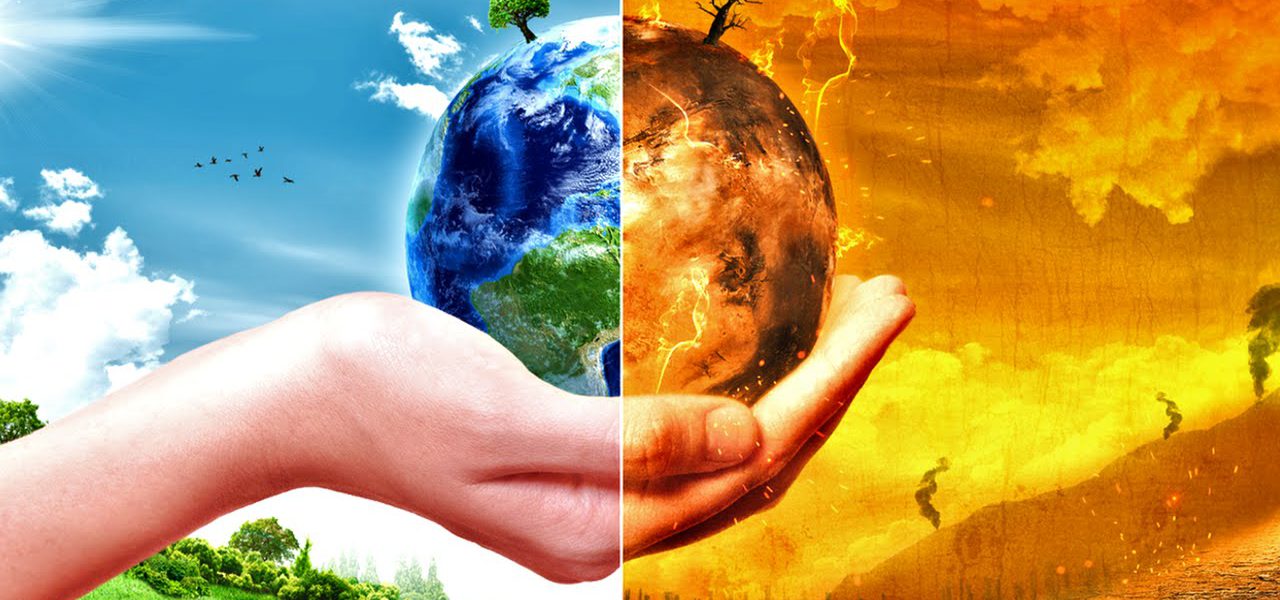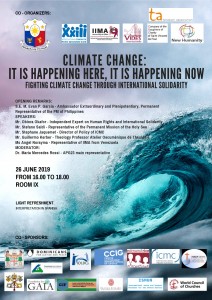
On June 26, 2019, CCIG co-sponsored the Side Event “Clima te Change: It is Happening Here, It is Happening Now”, held in conjunction with the 41st Session of the United Nations Human Rights Council. . It was co-organized by the Permanent Mission of the Philippines and several CCIG members, namely Associazone Communita Papa Giovanni XXIII, IIMA, VIDES, Teresian Association, Company of the Daughters of Charity of Saint Vincent de Paul, among others. The event highlighted that Climate Change is undoubtedly one of the greatest global challenge that our world is facing today because of its devastating impact on all life, of how it threatens perpetuation of all that is living and how it aggravates the existing inequalities among countries and vulnerabilities among communities and peoples.
te Change: It is Happening Here, It is Happening Now”, held in conjunction with the 41st Session of the United Nations Human Rights Council. . It was co-organized by the Permanent Mission of the Philippines and several CCIG members, namely Associazone Communita Papa Giovanni XXIII, IIMA, VIDES, Teresian Association, Company of the Daughters of Charity of Saint Vincent de Paul, among others. The event highlighted that Climate Change is undoubtedly one of the greatest global challenge that our world is facing today because of its devastating impact on all life, of how it threatens perpetuation of all that is living and how it aggravates the existing inequalities among countries and vulnerabilities among communities and peoples.
It focused on the environmental, human and social cultural impacts of climate change and the need to create synergy with all stakeholders in an integrated and coherent way, enabling States to achieve their objectives under the Paris Agreement and the Sustainable Development Goals (SDGs) 2030. It aimed to give emphasis on the need for an urgent and immediate response which reflects the spirit of a new international solidarity.
The panel was made up of S.E. M. Evan P. Garcia, Ambassador Extraordinary and Plenipotentiary Permanent Representative of the Philippines, Mr. Obiora Okafor, Independent Expert on Humans Rights and International Solidarity, Mr. Stefano Saldi, Representative of the Permanent Mission of the Holy See, Mr. Stephane Jaquemet, International Catholic Migration Commission (ICMC) Director of Policy, Mr. Guillermo Kerber, Theology Professor at the the Atelier Oecuménique de Théologie and a member of CCIG Board, and Ms. Norayma Angel, representative of IIMA from Venezuela. Moderating the discussion was Dr. Maria Mercedes Rossi, main representative of APGXXIII.
Dr. Kerber was tasked to talk on the “Spiritual Approach to Climate Change” and he affirmed the urgency of a global call for climate action. Various inter-governmental panels on the topic have stressed that a high percentage of climate change is caused by human behaviour and that the international community is given a narrow window to face this crisis together. Though the Holy Scriptures does not speak about climate change, Jews and Christians believe that the world is created by God who has placed man/woman in it to work and care for it. The Muslims adhere to the same. In the pivotal encyclical Laudato Si, Pope Francis’s call for care for our common home has gone beyond Catholic and Christian circles. He mentioned the 2014 Interfaith Summit held in New York which sought to highlight the specific contributions that faith traditions bring to the international climate debate. He identified three obstacles: 1) although humans have not contributed equally to this problem, we have been arrogant to believe that earth will always be there to provide for us, 2) man/woman’s abysmal desire for material goods and 3) man/woman’s alienation from the ancestral land and indigenous wisdom. Hence, there is a need for ecological conversion on a very deep level, in attitude, mind and spirit. We need hope to compel us to conversion, intergenerational justice to move us to action so that personal and individual changes become translated into bold political actions.
